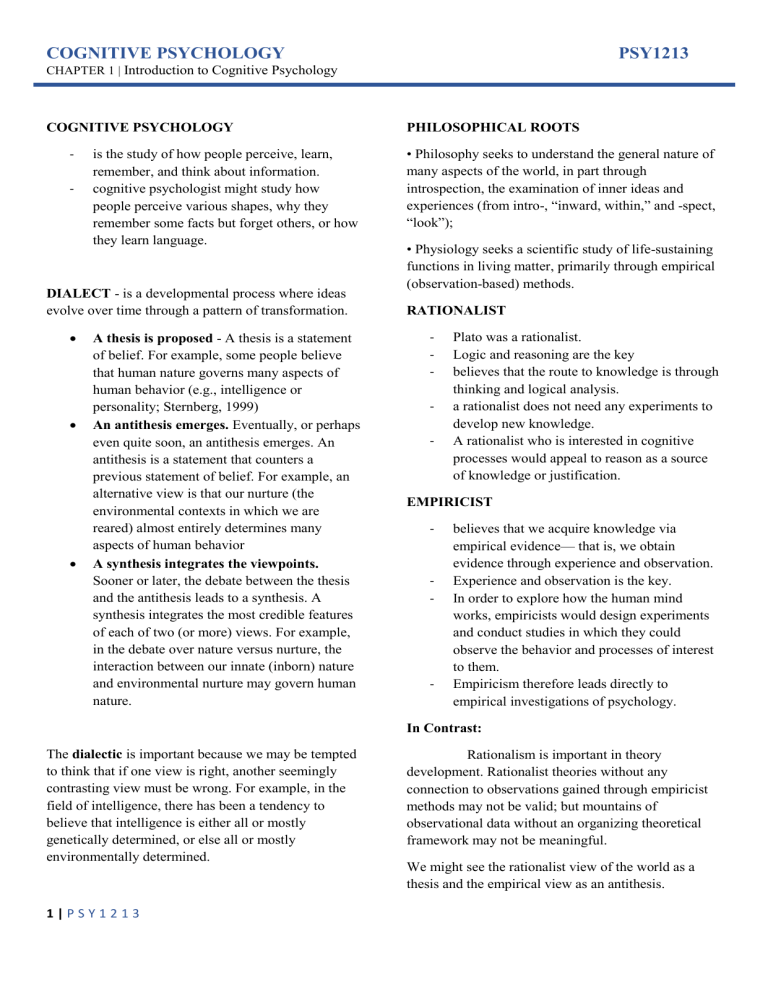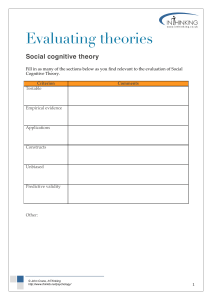
COGNITIVE PSYCHOLOGY PSY1213 CHAPTER 1 | Introduction to Cognitive Psychology COGNITIVE PSYCHOLOGY - is the study of how people perceive, learn, remember, and think about information. cognitive psychologist might study how people perceive various shapes, why they remember some facts but forget others, or how they learn language. DIALECT - is a developmental process where ideas evolve over time through a pattern of transformation. A thesis is proposed - A thesis is a statement of belief. For example, some people believe that human nature governs many aspects of human behavior (e.g., intelligence or personality; Sternberg, 1999) An antithesis emerges. Eventually, or perhaps even quite soon, an antithesis emerges. An antithesis is a statement that counters a previous statement of belief. For example, an alternative view is that our nurture (the environmental contexts in which we are reared) almost entirely determines many aspects of human behavior A synthesis integrates the viewpoints. Sooner or later, the debate between the thesis and the antithesis leads to a synthesis. A synthesis integrates the most credible features of each of two (or more) views. For example, in the debate over nature versus nurture, the interaction between our innate (inborn) nature and environmental nurture may govern human nature. PHILOSOPHICAL ROOTS • Philosophy seeks to understand the general nature of many aspects of the world, in part through introspection, the examination of inner ideas and experiences (from intro-, “inward, within,” and -spect, “look”); • Physiology seeks a scientific study of life-sustaining functions in living matter, primarily through empirical (observation-based) methods. RATIONALIST - Plato was a rationalist. Logic and reasoning are the key believes that the route to knowledge is through thinking and logical analysis. a rationalist does not need any experiments to develop new knowledge. A rationalist who is interested in cognitive processes would appeal to reason as a source of knowledge or justification. EMPIRICIST - - - believes that we acquire knowledge via empirical evidence— that is, we obtain evidence through experience and observation. Experience and observation is the key. In order to explore how the human mind works, empiricists would design experiments and conduct studies in which they could observe the behavior and processes of interest to them. Empiricism therefore leads directly to empirical investigations of psychology. In Contrast: The dialectic is important because we may be tempted to think that if one view is right, another seemingly contrasting view must be wrong. For example, in the field of intelligence, there has been a tendency to believe that intelligence is either all or mostly genetically determined, or else all or mostly environmentally determined. 1|PSY1213 Rationalism is important in theory development. Rationalist theories without any connection to observations gained through empiricist methods may not be valid; but mountains of observational data without an organizing theoretical framework may not be meaningful. We might see the rationalist view of the world as a thesis and the empirical view as an antithesis. COGNITIVE PSYCHOLOGY PSY1213 CHAPTER 1 | Introduction to Cognitive Psychology Most psychologists today seek a synthesis of the two. They base empirical observations on theory in order to explain what they have observed in their experiments. In turn, they use these observations to revise their theories when they find that the theories cannot account for their real-world observations. Contrasting ideas of rationalism and empiricism René Descartes - - - French rationalist viewed the introspective, reflective method as being superior to empirical methods for finding truth. The famous expression “cogito, ergo sum” (I think, therefore I am) stems from Descartes. He maintained that the only proof of his existence is that he was thinking and doubting. Descartes felt that one could not rely on one’s senses because those very senses have often proven to be deceptive (think of optical illusions, for example). John Locke - - British empiricist had more enthusiasm for empirical observation. Locke believed that humans are born without knowledge and therefore must seek knowledge through empirical observation. Locke’s term for this view was tabula rasa (meaning “blank slate” in Latin). The idea is that life and experience “write” knowledge on us. For Locke, then, the study of learning was the key to understanding the human mind. He believed that there are no innate ideas. Understanding the Structure of the Mind: Structuralism Structuralism - seeks to understand the structure (configuration of elements) of the mind and its perceptions by analyzing those perceptions into their constituent components (affection, attention, memory, sensation, etc.). Wilhelm Wundt - - Edward Titchener - - German philosopher dialectically synthesized the views of Descartes and Locke. arguing that both rationalism and empiricism have their place. Both must work together in the quest for truth. Most psychologists today accept Kant’s synthesis. 2|PSY1213 is sometimes viewed as the first full-fledged structuralist. he certainly helped bring structuralism to the United States. His experiments relied solely on the use of introspection, exploring psychology from the vantage point of the experiencing individual. Understanding the Processes of the Mind: Functionalism Functionalism - Immanuel Kant - a German psychologist whose ideas contributed to the development of structuralism. often viewed as the founder of structuralism in psychology (Structuralism, 2009). Introspection is a deliberate looking inward at pieces of information passing through consciousness. The aim of introspection is to look at the elementary components of an object or process. - seeks to understand what people do and why they do it functionalism suggested that psychologists should focus on the processes of thought rather than on its contents. This principal question about processes was in contrast to that of the structuralists, who had asked what the elementary contents (structures) of the human mind are. Functionalists held that the key to understanding the human mind and behavior was to study the processes of how and why the COGNITIVE PSYCHOLOGY PSY1213 CHAPTER 1 | Introduction to Cognitive Psychology mind works as it does, rather than to study the structural contents and elements of the mind. Pragmatists - believe that knowledge is validated by its usefulness: What can you do with it? Pragmatists are concerned not only with knowing what people do; they also want to know what we can do with our knowledge of what people do. William James - - A leader in guiding functionalism toward pragmatism An Integrative Synthesis: Associationism Associationism examines how elements of the mind, like events or ideas, can become associated with one another in the mind to result in a form of learning. From Associationism to Behaviorism Behaviorism focuses only on the relation between observable behavior and environmental events or stimuli. The idea was to make physical whatever others might have called “mental”. Ivan Pavlov - associations may result from: • contiguity (associating things that tend to occur together at about the same time); • similarity (associating things with similar features or properties); or • contrast (associating things that show polarities, such as hot/cold, light/dark, day/ night). - - - Through his self-observations, Ebbinghaus studied how people learn and remember material through rehearsal, the conscious repetition of material to be learned. he found that frequent repetition can fix mental associations more firmly in memory. Thus, repetition aids in learning. Proponents of Behaviorism - - Edward Lee Thorndike - held that the role of “satisfaction” is the key to forming associations. Thorndike termed this principle the law of effect (1905): A stimulus will tend to produce 3|PSY1213 studied involuntary learning behavior of this sort. He began with the observation that dogs salivated in response to the sight of the lab technician who fed them. this response indicated a form of learning (classically conditioned learning), over which the dogs had no conscious control. Effective conditioning requires contingency Behaviorism may be considered an extreme version of associationism. It focuses entirely on the association between the environment and an observable behavior. Hermann Ebbinghaus - a certain response over time if an organism is rewarded for that response. Thorndike believed that an organism learns to respond in a given way (the effect) in a given situation if it is rewarded repeatedly for doing so (the satisfaction, which serves as a stimulus to future actions). - The “father” of radical behaviorism is John Watson (1878–1958). Watson had no use for internal mental contents or mechanisms. He believed that psychologists should concentrate only on the study of observable behavior. B. F. Skinner (1904–1990), a radical behaviorist, believed that virtually all forms of human behavior, not just learning, could be explained by behavior emitted in reaction to the environment. Skinner conducted research primarily with nonhuman animals. COGNITIVE PSYCHOLOGY PSY1213 CHAPTER 1 | Introduction to Cognitive Psychology - He rejected mental mechanisms. He believed instead that operant conditioning—involving the strengthening or weakening of behavior, contingent on the presence or absence of reinforcement (rewards) or punishments— could explain all forms of human behavior. Early Role of Psychobiology - Behaviorists Daring to Peek into the Black Box - - - - Some psychologists rejected radical behaviorism. They were curious about the contents of the mysterious black box. Behaviorists regarded the mind as a black box that is best understood in terms of its input and output, but whose internal processes cannot be accurately described because they are not observable. Edward Tolman, thought that understanding behavior required taking into account the purpose of, and the plan for, the behavior. He believes that all behavior is directed toward a goal. Tolman is sometimes viewed as a forefather of modern cognitive psychology. - - Gestalt Psychology - states that we best understand Karl Spencer Lashley brashly challenged the behaviorist view that the human brain is a passive organ merely responding to environmental contingencies outside the individual Lashley considered the brain to be an active, dynamic organizer of behavior Donald Hebb targeted cells as the center of learning. Chompsky’s review of Skinner’s Verbal Behavior: “reductio ad absurdum” 1950’s development of computers. “Turing test,” - which a computer program would be judged as successful to the extent that its output was indistinguishable, by humans, from the output of humans. Artificial intelligence (AI) is the attempt by humans to construct systems that show intelligence and, particularly, the intelligent processing of information. Cognitive Revolution – occurred and increased interest in the study of mental processes. psychological phenomena when we view them as organized, structured wholes. - - - According to this view, we cannot fully understand behavior when we only break phenomena down into smaller parts. Gestaltists, in contrast, studied insight, seeking to understand the unobservable mental event by which someone goes from having no idea about how to solve a problem to understanding it fully in what seems a mere moment of time. The maxim “the whole is more than the sum of its parts” aptly sums up the Gestalt perspective. Cognitivism is the belief that much of human behavior can be understood in terms of how people think. It rejects the notion that psychologists should avoid studying mental processes because they are unobservable. 4|PSY1213 Cognition and Intelligence


